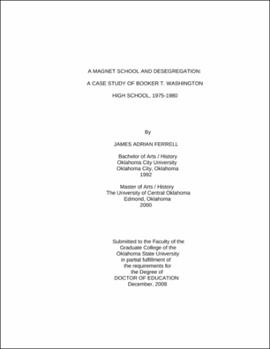| dc.contributor.advisor | Stern, A. Kenneth | |
| dc.contributor.author | Ferrell, James Adrian | |
| dc.date.accessioned | 2013-11-26T08:34:26Z | |
| dc.date.available | 2013-11-26T08:34:26Z | |
| dc.date.issued | 2008-12 | |
| dc.identifier.uri | https://hdl.handle.net/11244/7393 | |
| dc.description.abstract | Scope and Method of Study: In 1976 the Supreme Court accepted magnet schools as viable parts of the criteria to gain unitary status; to be declared desegregated by the federal government. This study examined the lives of a sample of African American graduates from Booker T. Washington High School (BTW), Tulsa's first magnet school, to determine if attendance at a magnet school aided in achieving the goals of desegregation. Graduates were interviewed regarding their experiences at BTW, families, friends in high school and before, goals in high school, and their lives since graduation. A second group included those associated with the creation of BTW as a magnet school. Those interviews centered on the associates' involvement in the creation of the magnet school, their perceptions of racial attitudes in the school and district before and after the magnet school, and their thoughts on the success of the magnet school in achieving the goals of desegregation. | |
| dc.description.abstract | Findings and Conclusions: Through the lens of perpetuation theory, the interview data revealed that all the graduates who participated in the study achieved the goals of desegregation after attending the magnet school. All of the graduates responded they attended, or could have attended, predominantly white higher education institutions. They stated they had strong family support and support from a large network of friends and teachers at BTW that aided in their being accepted in higher education institutions. All of the graduates responded they had lived successful lives since their graduation and linked that success back to attendance at BTW. They also responded they were able to deal with minority situations in their lives with ease, especially two graduates who were "double" minorities in their fields. Perpetuation theory consists of two parts: the breaking down of fears concerning integrated situations and the development of social networks that lead to opportunities that otherwise may not have existed. Perpetuation theory showed that magnet school attendance at BTW aided in the development of both of these aspects for the graduates interviewed. The interviews with those associated with the creation of BTW revealed they had the purpose of creating a school that maintained the traditions of the former de jure Black high school. A single controversy emerged regarding the attendance zone of BTW because the district made all students apply for admission. The study offers suggestions to alleviate these tensions when other districts are faced with similar circumstances. | |
| dc.format | application/pdf | |
| dc.language | en_US | |
| dc.rights | Copyright is held by the author who has granted the Oklahoma State University Library the non-exclusive right to share this material in its institutional repository. Contact Digital Library Services at lib-dls@okstate.edu or 405-744-9161 for the permission policy on the use, reproduction or distribution of this material. | |
| dc.title | Magnet school and desegregation: A case study of Booker T. Washington High School, 1975-1980 | |
| dc.contributor.committeeMember | Harris, Edward | |
| dc.contributor.committeeMember | Krum, Bernita | |
| dc.contributor.committeeMember | Williams, Elizabeth | |
| osu.filename | Ferrell_okstate_0664D_10024.pdf | |
| osu.accesstype | Open Access | |
| dc.type.genre | Dissertation | |
| dc.type.material | Text | |
| dc.subject.keywords | booker t. washington high school | |
| dc.subject.keywords | desegregation | |
| dc.subject.keywords | magnet schools | |
| dc.subject.keywords | perpetuation theory | |
| dc.subject.keywords | tulsa | |
| thesis.degree.discipline | Educational Administration | |
| thesis.degree.grantor | Oklahoma State University | |
